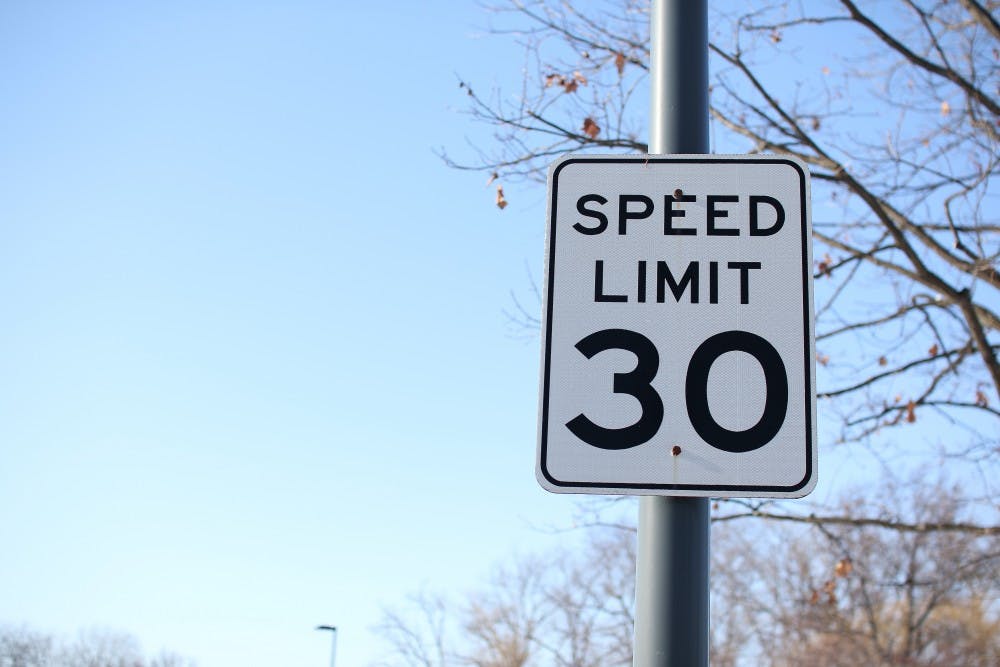A speed limit reduction will take effect on Ball State streets in the next two to three weeks after a decision by Muncie city officials and the university.
All the major campus roads, including McKinley Avenue, Neely Avenue, Riverside Avenue, University Avenue and Talley Avenue will have a new speed limit of 20 miles per hour, a change from their current 30 miles per hour speed limit.
Jim Lowe, Ball State’s associate vice president for Facilities Planning and Management, suggested the reductions with the help of the Muncie Public Safety Department to Duke Campbell about a month ago. Campbell serves as the Muncie Superintendent of the Department of Public Works.
Lowe worked with both Campbell and Mayor Dennis Tyler to create a plan to increase safety on campus and throughout Muncie. He said they agreed that a speed limit reduction is the best change at this time to protect students.
"It's a school zone. Duke [Campbell] and the mayor are in agreement," Lowe said. "And this will be a great improvement for student and faculty safety."
The development of Ball State and The Village is one of the main reasons Lowe said he saw a need for a change. As more buildings, businesses and apartment buildings are added to and around campus, more pedestrians will be found on Ball State streets.
"We developed, we matured," Lowe said. "There's crossings everywhere where you could have a potential for impact."
The new speed limits will help prevent accidents, Lowe said, because stopping distance decreases for vehicles the slower they are going. Drivers will be able to come to a stop faster if a pedestrian walks in front of them, as well as avoid collisions with other cars.
But even with the focus on safety, Ball State students have reacted in different ways to the decision.
Luke Owens, a junior philosophy and religious studies major, identified himself as primarily a pedestrian when it comes to navigating Ball State's campus. He said he almost always feels safe walking on Ball State streets and doesn't understand the need for a decreased speed limit.
"I don't see too many reckless drivers. And I've never felt scared for my life or a need for a lower speed limit," Owens said. "It just seems over the top. Why not change to 25 before changing to 20?"
Owens said he doesn’t think the change will do much good. He said drivers will continue to go whatever speeds they are used to.
"People need to get to class," Owens said. "And even though I don't drive, I know driving 20 would annoy me.”
Another student, senior exercise science major Olivia Horvath, drives to campus everyday. She has commuted from her home in Cowan, Ind., since her freshman year at Ball State.
Horvath is a commuter ambassador for Ball State. She works with freshman students who commute to campus and helps them adjust to college life.
With herself and her commuter students in mind, Horvath said she doesn't necessarily see many problems with the new speed limit.
"I don't think it will really make a huge difference," Horvath said. "I come to campus at 7:30 [a.m.] every day and I almost never hit 30 on McKinley anyway. I don't think it'll affect my drive time here."
Horvath also said she doesn't think her commuter students will care or be affected when driving to campus, because they rarely drive on the affected roads.
"As a commuter, by the time you hit McKinley you're pulling into a parking lot," Horvath said. "I don't think hardly any of my students ever drive through the middle of campus."
Like Owens, Horvath said she thinks students, faculty or anyone driving through campus will continue to go whatever speed surrounding traffic will allow them to go, regardless of a speed limit change.
"People speed. Yeah, I thought that 25 miles per hour would make more sense before jumping to 20, but they're not that different," Horvath said. "If the speed limit's 20, it's basically 25. And 25 is really 30."
After the new speed limits are introduced, the city of Muncie will have a 90-day trial period before the city council makes its final decision on whether the new regulations are permanent or not.





